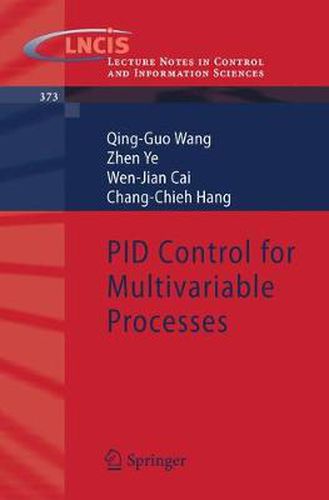Readings Newsletter
Become a Readings Member to make your shopping experience even easier.
Sign in or sign up for free!
You’re not far away from qualifying for FREE standard shipping within Australia
You’ve qualified for FREE standard shipping within Australia
The cart is loading…






This title is printed to order. This book may have been self-published. If so, we cannot guarantee the quality of the content. In the main most books will have gone through the editing process however some may not. We therefore suggest that you be aware of this before ordering this book. If in doubt check either the author or publisher’s details as we are unable to accept any returns unless they are faulty. Please contact us if you have any questions.
Thereare richtheories and designs for generalcontrolsystems,but usually, they will not lead to PID controllers. Noting that the PID controller has been the most popular one in industry for over ?fty years, we will con?ne our discussion hereto PIDcontrolonly. PID controlhasbeenanimportantresearchtopicsince 1950’s, and causes remarkable activities for the last two decades. Most of the existing works have been on the single variable PID control and its theory and design are well established, understood and practically applied. However, most industrial processes are of multivariable nature. It is not rare that the overall multivariable PID control system could fail although each PID loop may work well. Thus,demandforaddressingmultivariableinteractionsishighforsuccessful applicationofPIDcontrolinmultivariableprocessesanditisevidentfrommajor leading control companies who all rankedthe couplings of multivariable systems as the principal common problem in industry. There have been studies on PID control for multivariable processes and they provide some useful design tools for certaincases. But itis notedthat the existing worksaremainlyfor decentralized form of PID control and based on ad hoc methodologies. Obvious, multivariable PID control is much less understood and developed in comparison with the single variable case and actual need for industrial applications. Better theory and design have to be established for multivariable PID control to reach the same maturity and popularity as the single variable case. The present monograph puts together, in a single volume, a fairly comp- hensive, up-to-date and detailed treatment of PID control for multivariable p- cesses, from paring, gain and phase margins, to various design methods and applications.
$9.00 standard shipping within Australia
FREE standard shipping within Australia for orders over $100.00
Express & International shipping calculated at checkout
This title is printed to order. This book may have been self-published. If so, we cannot guarantee the quality of the content. In the main most books will have gone through the editing process however some may not. We therefore suggest that you be aware of this before ordering this book. If in doubt check either the author or publisher’s details as we are unable to accept any returns unless they are faulty. Please contact us if you have any questions.
Thereare richtheories and designs for generalcontrolsystems,but usually, they will not lead to PID controllers. Noting that the PID controller has been the most popular one in industry for over ?fty years, we will con?ne our discussion hereto PIDcontrolonly. PID controlhasbeenanimportantresearchtopicsince 1950’s, and causes remarkable activities for the last two decades. Most of the existing works have been on the single variable PID control and its theory and design are well established, understood and practically applied. However, most industrial processes are of multivariable nature. It is not rare that the overall multivariable PID control system could fail although each PID loop may work well. Thus,demandforaddressingmultivariableinteractionsishighforsuccessful applicationofPIDcontrolinmultivariableprocessesanditisevidentfrommajor leading control companies who all rankedthe couplings of multivariable systems as the principal common problem in industry. There have been studies on PID control for multivariable processes and they provide some useful design tools for certaincases. But itis notedthat the existing worksaremainlyfor decentralized form of PID control and based on ad hoc methodologies. Obvious, multivariable PID control is much less understood and developed in comparison with the single variable case and actual need for industrial applications. Better theory and design have to be established for multivariable PID control to reach the same maturity and popularity as the single variable case. The present monograph puts together, in a single volume, a fairly comp- hensive, up-to-date and detailed treatment of PID control for multivariable p- cesses, from paring, gain and phase margins, to various design methods and applications.